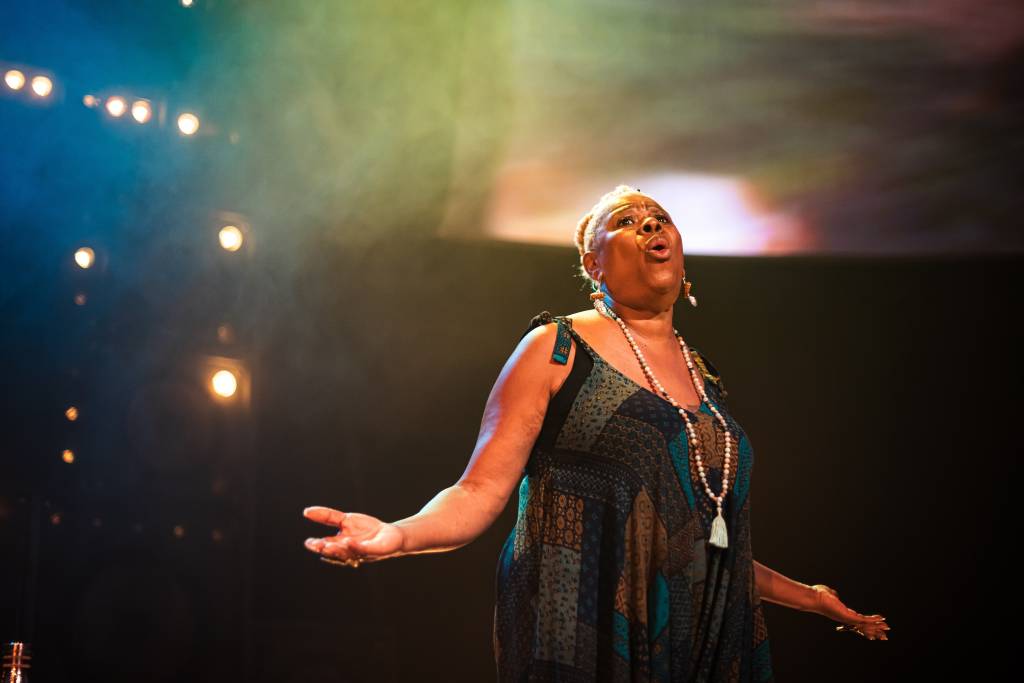Monique Touko is taking a break from the rehearsal room as we speak with her by telephone about The Clinic, the new play by Dipo Baruwa-Etti, which she is directing at the Almeida Theatre. She’s relaxed about the process so far as they come towards the end of week three of rehearsals. “It feels like it’s going the pace that it should…the vision’s coming together. So, yeah, I’m happy we’re in a good place.”
The Clinic, opening for previews on 3 September, is centered around a middle-class Nigerian family who welcome fellow Nigerian woman Wunmi, played by Toyin Ayedun-Alase, into their home. Their aim is to help her, restore her and ensure that she doesn’t end her life. “She causes a bit of a wildfire in the house, in a kind of metaphorical sense,” says Touko. Wumni exposes the cracks within the family.
“[It’s] very much about how much can Black middle-class and upper-class people help Black working-class people. What can you do with your power and your privilege? Does earning money mean that you then have distance from the fight and the idea of progressing?” says Touko. But it also relates to the climate that we live in at the moment, she says. “With Black Lives Matter, and just where people are at in society, how far do we have to go to ensure that we are equal?”
 |
| Monique Touko |
The play, written by Baruwa-Etti during a twelve-month residency with the Almeida as part of the Channel 4 Playwrights’ bursary, is also interesting because it is from a Nigerian middle-class perspective. It’s something that is quite rare Touko says. “A lot of the time depictions of Black families are either working class or it’s very African-based… but this being a British-Nigerian story is what makes it unique.”
It also a play that approaches racism on its own terms. “There’s no white characters [and] a lot of the time racism is discussed in relation to whiteness, but this feels like a conversation within the community, which is really exciting,” she says. “There’s something new about this way of looking at Black issues and Black problems.”
I wondered if she thinks audiences will react differently to the production when it frames the conversation around racism through a different lens – one that they would not ordinarily encounter. Touko doesn’t think they will. “It’s more like; ‘oh, this is really refreshing to see these depictions on stage.’ And I think, because of the nature of how it’s been written, it feels like it’s a very universal story; it’s centered around a family with family drama, family dynamics. So, regardless of your race and where you come from, you’ll still be able to lean into the story and understand these dynamics amongst the family.”
We talk about her approach to directing; detail, collaboration, movement and music come to the fore. “I like detail and I like to ensure that we are honouring the text. I spend a lot of my first week just doing table work and a lot of research [so that we’re] all on the same page in terms of what story we’re telling. I like a room that feels collaborative, and it feels like we’re working together. I love a lot of movement [and] I love music. So that’s always a key part of all my shows… because there’s a lot you can say without saying much at all.”
 |
| The cast of The Clinic in rehearsals at the Almeida. Photo: Marc Brenner |
And she’s impressed by the Almeida’s approach to programming work like The Clinic. “It’s really refreshing and important that they’re putting on work like this. Obviously, there’s Black people on stage, but the fact that I’m Black, the writers Black – I feel like there’s a real effort to try and ensure that the representation isn’t just on stage, it’s also behind the scenes… the story’s being told in the truest way.”
But Touko knows there’s more to do, and it’s something that’s reflected in The Clinic. “Dipo, the writer, said that his activism is through the plays that he writes, and ensuring that there’s Black people on stage – he’s writing Black characters and writing Black stories. Like, what is your own personal activism? It doesn’t necessarily mean drawing placards and running through the streets, but in what ways can we help each other? And that’s within the Black community, and also white people as well – our allies. How can they help to make the situation a bit better?”
The Clinic is at the Almeida Theatre from 3 September to 1 October














